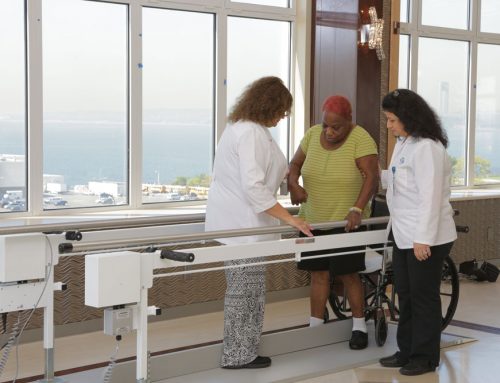It is quite common to feel fatigued after surgery, regardless of whether it was a minor or major procedure. This is because your body expends a lot of energy afterward trying to heal. There is an immune response that kicks in, which can be physically draining as well. Though the duration of the healing process can vary, there are many ways to beat fatigue after surgery.
These can include proper eating and hydration habits, some exercise, and taking it easy, just to name a few. You may also need post-surgery care and restorative therapies. Of course, the information we’re providing is strictly informational. Be sure to speak to your doctor before altering any of the activities discussed below.

How to Beat Fatigue After Surgery?
There are several ways that you can beat fatigue after surgery. These are simple changes you can make that can increase your energy levels and help to speed up the healing process.
- Stay hydrated
Hydration is the first step. Be sure to drink plenty of water and other fluids to improve blood circulation and remove toxins.
- Avoid caffeine
While fluids are important to beat fatigue after surgery, it’s best to avoid caffeinated beverages, like coffee and soft drinks. Though they give you an energy boost, you’ll also crash soon afterward.
- Avoid alcohol
Alcohol should also be avoided, especially if you’re on medication. It weakens and slows the body.
- Eat healthy
Eating balanced meals is another way to combat and beat fatigue after surgery. Adding a variety of iron-rich foods can increase your hemoglobin levels. This includes legumes, green vegetables, broccoli, beef, chicken, tuna, nuts, sardines, and even breakfast cereals. Be sure to eat regular meals as well, even if don’t feel hungry. Smaller meals are better than none at all.
- Gentle exercises
Some very gentle exercises can increase your strength and reduce fatigue. Take it slow and steady, doing small exercises a few times a day. A trained physical or occupational therapist can also help if needed until you’re strong enough to do it on your own.
- Stay positive
Staying positive is crucial to recover and beat fatigue after surgery. So, try to stay away from any kind of stress. You should also use pain medication only when needed since too much of it can increase your fatigue. Simply staying positive can improve your outlook for a speedy recovery.
How long does post-surgical fatigue last?
There is no set time limit on how long post-surgical fatigue lasts. This is because different procedures have varying effects on your body. The more intensive the surgical procedure is, the longer your recovery time will be, including the exhaustion you’re feeling.
Other issues may also make it more difficult to beat fatigue after surgery. Your sleep quality can be affected due to medications, anesthesia, or even from difficulty sleeping in a medical environment. You may need to fast before surgery or lose your appetite afterward. Blood loss, emotional stress, and even your age can also be factors that can lengthen your recovery time.
A lack of movement can lead to exhaustion since it causes alterations in your body over time. Of course, moving too much can also cause injury, so it’s best not to try too much activity too quickly. This will prolong your recovery, which makes it even more difficult to beat fatigue after surgery.
Be sure to follow the advice of your doctor and therapist. This will ensure that you’re recovering properly with minimal complications.
This content comprises informative and educational resources only and can not be considered as a substitute for professional health or medical guidance. Reliance on any information provided in this article is solely at your own risk. If you have any inquiries or apprehensions about your medical condition or health goals, talk with a licensed physician or healthcare provider.






Thank you! I am very impress on your suggestions clear and simple. Easy to apply and sound very true.
at 80 years old my wife and I are going together through this journey with positive and love.
sincerely emil n brenda c
I had a fall and broke my wrist 3 weeks later severely fatigued throughout day , just getting dinner ready for myself is tireing.
Just going through the same thing!
Had a hernia repair surgery go bad. Now two weeks later going home from the hospital. Still weak a kitten it seems. But making progress and have been told to look forward to a three month recovery time. These all seem like good suggestions. Especially concerning caffeine and helping with fatigue. Haven’t had a cup of coffee in two weeks. Anyway I hope that by following all of these will be able to speed up the recovery time some.
Hi Craig.
I’m so sorry to hear that your hernia repair didn’t go so well 🙁
I had an umbilical hernia repair 3 weeks ago & I’ve never felt such pain. Considering I’ve had a full hysterectomy & my gallbladder removed too.
I’m still sore, so bruised & exhausted. And don’t forget tearful (which I’m usually not)
I don’t normally reply to things online, but your story spoke to me.
Wishing you well & I hope you have a quick & leisurely convalescence.
Regards
Michelle
I had intestinal surgery about 3 weeks ago I am 67 the first couple of day was hard now I am home and not doing any lifting and sometimes I feel fine BUT I am more tired. being tired worries me but I hear it’s normal I just want to feel like I always felt before
I am in my 8th month i am fatigued tired weak sleep deprived in pain and most irritating is I am at 45 degrees and favor slight lean to right side. So I want to thank you for this information , it seems a long road home to recovery…oh boy lol…
Jim Collins.
You have made me feel less stupid for wondering about my ongoing lack of energy and breathlessness 5 months out. Nobody told me about Iron supplementation. I have neuro issues, so I asked all doctors to please tell my father or other supports what I needed because I forget, and I double-checked. Now nurses tell me I had very low iron pre-surgery. And iron is also vital pre-radiation. So I went to get my Iron & Hematocrit tested, oddly all the numbers are smack dab in the middle. I am so confused. (And tired, breathless, fatter, etcetera…)
Thank you , it makes good sense. Supporting comments
I had surgery on my carotid artery. I spent one night in ICU and then I returned home. The surgery was one week ago today. I am beyond tired. I have zero energy. The nurse practitioner I saw today told me to have a couple protein drinks throughout the day which would help boost my energy. So I’m going to try that. It looks like all my blood work is where it should be so maybe the protein will help.
Hola mi hija tubo jna cirujia de garganta estoy preocupada porke este dia 6despues y no a comido absolutamente nada , y la veo muy devil eso es comun despues ???? 9th
Had major shoulder surgery this week. Finding I’m very fatigued 4 days later . Walked on treadmill for an hour thinking it would boost my energy but it didn’t help . Iced my shoulder up and fell asleep on the couch after . I had prior surgery on opposite shoulder 15 years ago and don’t remember being this tire . Guess getting older makes a difference.
Hi Rich. I’m 70. Had fully shoulder replacement November 9. Still feeling tired but a short walk each day does me good. A warm nightly shower and early to my recliner to sleep is working well week 3.
Hi Rich, had full left shoulder replacement surgery 7 weeks ago. I am 70. I am just now starting to feel better. PT is killer! Ice and Alleve help. I dont like pain meds. My husband has been amazing helping me. I am right handed so no problem there but to dry off and dress after a shower and Im trying hard, isn’t at full speed lol. Just rest when tired. Eat – I still don’t have my taste buds back. Three hours of surgery anesthesia and a vent will do that! So I’m eating as I feel like it. I guess this recovery is as miserable as we were told it would be but I’m keeping a good outlook even when the pain gets brutal. Merry Christmas and feel better my friend! 🙏🎄😀
Had colectomy and have been home 3 weeks. Having trouble w stamina and still have some surgical pain. Trying to walk but SO hard to motivate
How are you feeling now? I just had left colon cancer removed Dec second and still very tired and hard to stand without lightheaded feelings.
Had major bowel surgery reconstruction of stomach old mesh removed and degradable mesh put in .How long before I can drive my age is 78 and I’m female
Excellent clear information. I was fortunate to have a keyhole operation on small inguinal hernia, feeling a bit tired . Excelent attention in public hospital in Sydney
Thank you for this opportunity.
I’m two months post spinal surgery I push myself to walk every morning up to 2 miles a day but in the afternoon I get so exhausted
I need a Power Nap by 3
Came from surgery a week ago for removal of wisdom teeth, currently on soft diet which I thought was the cause for my fatigue until reading your article.
I’m supposed to go back to work tomorrow, I feel really tired. especialy today after a meal my chest feels heavy. Il try these suggestions to pick up my energy levels.
Still so tired after 5 weeks following ankle replacement surgery. I don’t drink much caffeine but will cut my one cup a day after reading the comments. Also because I eat healthy if my friends bring me choclate that I is more pure with 70% cocoa which is full of caffeine. It’s good to be aware of the ways in which we can unconsciously sabotage ourselves.
I had 8 inches of colon removed 4 weeks ago, didn’t have to have any uterus repair. I’m still extremely tired and having some symptoms like menstrual cramps. Is this normal?
So glad I cane you this site. I had TKR Oct 26
2022.,
I’ve never been this tired in my life. I take care of my husband and was gonna take him home with me but had to get an extension at the nursing home, cuz I have no energy. I’ve always drank almost a gallon of water a day. But I notice that I’m not even drinking 1/2 that.,my pain has subsided a bit but not what I thought for 5 weeks out. Still taking oxy for exercise and sleep.cut back way too soon so an having to take regular dose again before my therapy. I am goin to make myself go to the gym today and at least complete one task on my list. I’m going to make my bed, as it is too easy to crawl back in.
I wish I could find a support group online to make myself accountable to.
This information is great! I am 42 and had 2 ankle surgeries 11 months apart. My husband says I have been low in energy for months. I am currently 1 week post op from the second surgery and can sleep over 12 hours a day. How long until my energy is normal again?
I had a much needed breast reduction surgery and I really thought the recovery process would go along much faster. I am only 56 years old and I am relatively good health. I don’t take the pain medication because ibuprofen is all I need. I am still very bruised and exhausted a week post operative. And the drains make it near impossible to get comfortable. Hoping this will soon be a distant memory to a well worth it difference in the future.
Hi Michelle,
I recently had a breast reduction as well 5 days ago and I am so exhausted. How are you doing now since your surgery?
I had Hiatal Hernia surgery a week ago & was doing pretty well. I had a couple days of diarrhea . Which was expected. Now a couple days later.. I have sudden weakness come over me. I am drinking ensure. Water & still not much help. I am 74 years old
Full knee replacement Nov 30, fell that afternoon and 3 broken ankle bones. Surgery for ankle was Dec 1. Lots of rehab for both areas and 7 weeks post surgeries I still tire very easily. Hoping it improves soon.
I have weakness a year after surgery and I’m getting weak and I feel weak they got me on vitamin B12 I don’t feel nothing with the vitamin B12 what can I do
I had a laparotomy 8 months ago. I still feel tired everday. Is it normal to have fatigue after months of surgery?
Just had total thyroidectomy had complications in recovery so was rushed back into theatre to fix a bleed. Never felt so sore and shattered. Only 3 days post op
I had a dental implant quite painful for at least 5 days, still some throbbing and 10 days later I am still so tired and drained Sleeping all the time and not feeling myself . I am hoping this is normal.
I am 71 and had a complete hysterectomy 2 weeks ago. I have never been this tired in my life. Pre-surgery I was very active and energetic. I lifted weights twice a week and since I live in NYC, i would walk everywhere everyday. Now I can barely walk 25 mins in the park before I have to sit. I can’t imagine this going on for months. Good luck to all.
I had a laparotomy 8 months ago. I still feel tired everday. Is it normal to have fatigue after months of surgery?
what about the mohse/mose surgery, how long to recover from a 2 and a half inch incision aroud the nose and cheek area?
I had the MILD procedure on my spine way back in February. I have never felt this tired and weak. It can’t be normal. They sent me for physical therapy but after weeks I hurt my back doing too much in therapy. They had me doing 70 pounds on the leg press. I am 74 and a week or more later it still feels sore. I can’t push myself due to depression and not being able to get back like I was before.
Hi I have a question My Husband just had a right hemi colectomy and it’s been four days without a bowel movement. He has gas but no bowel movement We have tried just about everything to get Him to use the bathroom I’m so worried. Has Anyone else had this issue? If so what did You do to help?
Had DBS (brain surgery). General anesthesia for MRI, Stage 1 surgery and stage 2 surgery. About 6 hours. Feel good but just want to sleep. Was told electrolytes would help. Been through 1 bottle expecting immediate results. Live in Texas. Can’t get out to walk because of the heat
Hello, thank you for this. I had a buy lobectomy in April for lung cancer. I’m a non-smoker it was genetic I’m a nurse I’ve been eating healthy and exercising my whole life. I’m very healthy otherwise but I’m not recovering well. I eat fruits, vegetables, and protein. I do pulmonary rehab I take walks but if I go to the grocery store I’m down for 16 hours solidly asleep and I do not recover for days. I’ve seen the doctor. They haven’t recommended anything also I can’t gain weight I’ve lost 20 pounds in surgery. All my margins were clear and all my lymph nodes were clear anything else I can do?
Sorry, there are some typos I lost 20 pounds since surgery
Thank all of you for your coments!!! I am 53 and had 6 bypass January 13. 2023 and i get so tired around 1-2 oclock. if you seen me you would think i workout and would think i shouldn’t have open heart surgery. and i lost 28 lbs. i just wanted to say thank you all for sharing it does help me some. i wish all of you the best of luck.
I had a humerus fracture surgery which required metal implants and 10 screws. It has been 10 months since the surgery and I’m still feeling the effects. Low energy and pain all over my body I figure the long recovery has left my body out f shape not to mention weight gain trough the winter. Prior to my accident I used to cycle or walk an average of 6 hours a day. Now days my limit is about 2 hours. I had no idea recovery would be this difficult.
I had my achilles tendon repaired along with removal of my bone spur I had on the back of my ankle ground down.
I had General Anesthesia and all the pain meds (ace, dexmethesone, fentanyl + 2 more) and was on Oxycodone for 4 days because of pain (2 every 4 hrs at one point bc the nerve pain was horrific)
Been 6 days and I’m an exhausted mess. I’m 26 and feel too young to still be this exhausted but have to keep reminding myself I just had ankle surgery.
Had back surgery one month ago I walk I’m not eating well too early to tell did it help I’ve been on hydrocodone for pain I want and I still have pain. I am not in therapy head about 42 stitches in my lower
back. I don’t have any strength tired need help
I have just had a unbiblical hernia opp and I have never had so much pain and feel so tired and sore how long will this last
I had knee total knee replacement on august 18th this year, I loss my appetite, eat better some times, my recovery went so fast I am driving already, but since my surgery I had some stressful situation at home, I am sleeping well though, lost some weight, and because I am not eating enough, I feel sometimes with fatigue and when eat something feel a little better
I had very bag pain for 4 Months was on high doses of cortisone, that made me so active and cold not sleep for months. I ended up with a major neck oppration and because of other pain in lower back I am still on lyrica 50mg per day and vimovo twice a day. My body feels exhausted and it is already 6 months after the operation. I need to work but the days feel to long. Could there be something else wrong with my body. Before all this happened I had endless energy